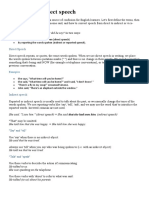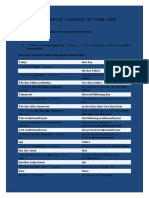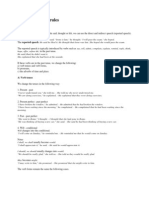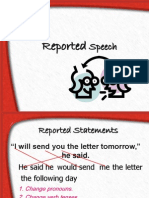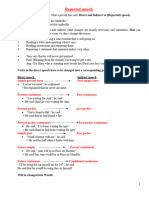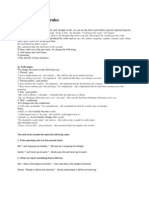0 ratings0% found this document useful (0 votes)
8 viewsOther Changes in Direct Speech
Uploaded by
Vesna AngelovskaCopyright
© © All Rights Reserved
Available Formats
Download as DOCX, PDF, TXT or read online on Scribd
0 ratings0% found this document useful (0 votes)
8 viewsOther Changes in Direct Speech
Uploaded by
Vesna AngelovskaCopyright
© © All Rights Reserved
Available Formats
Download as DOCX, PDF, TXT or read online on Scribd
You are on page 1/ 1
Phrase in direct speech Equivalent in reported speech
today that day
"I saw him today", she said. She said that she had seen him that day.
yesterday the day before
"I saw him yesterday", she said. She said that she had seen him the day before.
The day before yesterday two days before
"I met her the day before yesterday",
He said that he had met her two days before.
he said.
Tomorrow the next/following day
"I'll see you tomorrow", he said He said that he would see me the next day.
The day after tomorrow in two days time/ two days later
"We'll come the day after tomorrow", They said that they would come in two days time/ two
they said. days later.
Next week/month/year the following week/month/year
"I have an appointment next week", she She said that she had an appointment the following
said. week.
Last week/month/year the previous/week/month/year
He told us that he had been on holiday the previous
"I was on holiday last week", he told us.
week.
ago before
"I saw her a week ago," he said. He said he had seen her a week before.
this (for time) that
"I'm getting a new car this week", she
She said she was getting a new car that week.
said.
this/that (adjectives) the
"Do you like this shirt?" he asked He asked if I liked the shirt.
here there
He said, "I live here". He told me he lived there.
In general, personal pronouns change to the third person singular or plural, except when the
speaker reports his own words:
I/me/my/mine, you/your/yours = him/his/her/hers
we/us/our/ours, you/your/yours = they/their/theirs
He said: "I like your new car." = He told her that he liked her new car.
I said: "I'm going to my friend's house." = I said that I was going to my friend's house.
You might also like
- Changing Time and Place References Reported Speech With ExamplesNo ratings yetChanging Time and Place References Reported Speech With Examples3 pages
- Changing Time and Place in Reported SpeechNo ratings yetChanging Time and Place in Reported Speech1 page
- Reported Speech - Changing time and place referencesNo ratings yetReported Speech - Changing time and place references4 pages
- Changing Time and Place References in Indirect SpeechNo ratings yetChanging Time and Place References in Indirect Speech1 page
- Direct and Indirect (Or Reported) Speech. IntroductionNo ratings yetDirect and Indirect (Or Reported) Speech. Introduction1 page
- Direct Speech and Reported Speech List of Pronouns and Time ExpressionsNo ratings yetDirect Speech and Reported Speech List of Pronouns and Time Expressions1 page
- Unit 11-Reported Speech& Reporting Verbs - QUNo ratings yetUnit 11-Reported Speech& Reporting Verbs - QU12 pages
- Pronouns Are Words We Use in The Place of A Full NounNo ratings yetPronouns Are Words We Use in The Place of A Full Noun17 pages
- REPORTED SPEECH New!teoria y Pract DificilNo ratings yetREPORTED SPEECH New!teoria y Pract Dificil6 pages
- Indirect (Reported) Speech in StatementsNo ratings yetIndirect (Reported) Speech in Statements4 pages
- Reported Questions: When We Are Reporting Questions, The Subject Comes Before The VerbNo ratings yetReported Questions: When We Are Reporting Questions, The Subject Comes Before The Verb2 pages
- Further Explanation About Reported SpeechesNo ratings yetFurther Explanation About Reported Speeches20 pages









